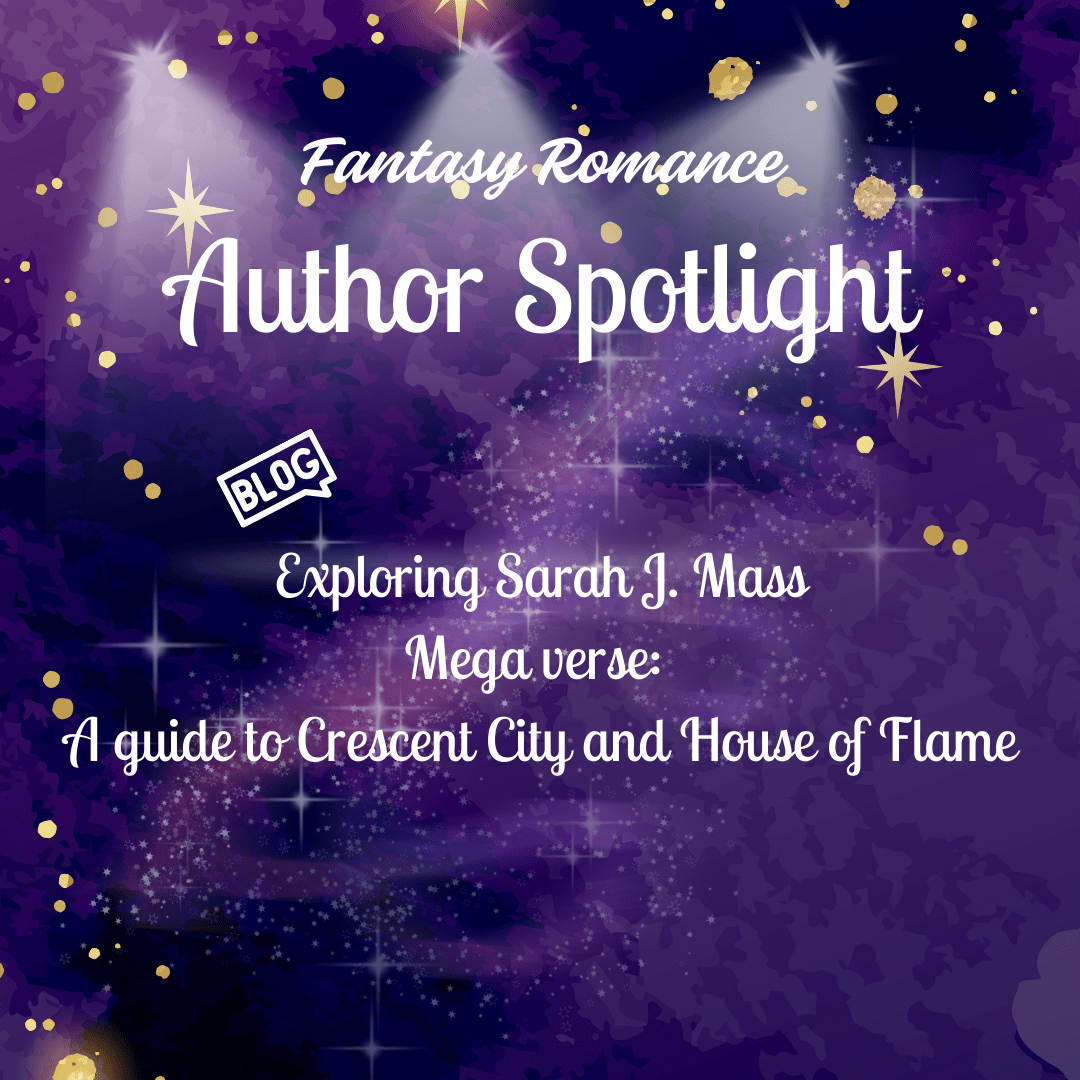For nearly two years, fans of Sarah J. Maas have been waiting to find out how the third book in her Crescent City series, House of Flame and Shadow, will bridge the gap between two of her three fantasy worlds. The crossover has been years in the making: Mass says that while she was working on the first book in the series, 2020’s House of Earth and Blood, she already knew that book two, 2022’s House of Sky and Breath, would end with Crescent City’s human-Fae hybrid heroine Bryce Quinlan making a magic-fueled jump into another realm.
“I had sprinkled little hints throughout all of my books that they were part of a megaverse,” Maas says. “Then, when I started writing Crescent City, I had this idea out of the blue that, bam, this is the moment. I just felt like, ‘I can f-cking do this. It’s going to be amazing.’”
As the author of three best-selling series—Throne of Glass, A Court of Thorns and Roses (ACOTAR), and Crescent City—whose 15-plus books have sold more than 38 million copies worldwide, Maas has established herself as a fantasy fiction titan. Her stories are known for blending intricate world building and compelling character development with steamy romances—a combination that has made her name nearly synonymous with the burgeoning fantasy subgenre “romantasy.”
Now, with the release of House of Flame and Shadow, Maas seems to have officially entered a new phase in the evolution of her expanding literary multiverse. Here’s what to know about House of Flame Shadow—and how it fits into the Maas-verse.
What happened at the end of House of Sky and Breath?
Crescent City book two, House of Sky and Breath, ended on a major cliffhanger, with an unwitting Bryce finding herself in the ACOTAR kingdom of Prythian rather than her intended destination of the planet Hel.
Bryce made the jump to Prythian after she, her mate, Hunt Athalar, and her half-brother, Ruhn Danaan, were captured inside the Crystal Palace of the Asteri, the parasitic god-like conquerors that rule over Bryce’s homeworld of Midgard. While holding the trio hostage, one of the Asteri, Rigelus, revealed that the magical star on Bryce’s chest is a beacon to the world from which her species of Fae came to Midgard 15,000 years earlier. (Both Bryce and Ruhn are descendants of the Starborn Fae, giving them power over starlight and the ability to wield the ancient blade known as the Starsword.) Since Bryce also has the remnants of the Horn—a Fae relic able to open rifts between worlds—tattooed into her back, the Asteri were planning to use Bryce to return to that world, where they were once overthrown, and conquer it anew.
Fortunately, Bryce was able to break free of her bonds, grab the Starsword, and—with the help of Hunt’s lightning powers—open and disappear through a portal to another world. Bryce meant to travel to Hel to seek help from the planet’s seven princes. Instead, she ended up in Prythian, where she was quickly discovered by Azriel (of ACOTAR fame) and taken to see Rhysand, Feyre, and the rest of the Night Court inner circle.
In the chamber, a magical hologram version of Silene, the youngest daughter of Midgard’s Queen Theia (from whom Bryce is descended), appears to Bryce and recounts the true story of how the Asteri (or Daglan, as they were known in Prythian) lured Theia and the Fae of the Dusk Court—which once existed in the location of the Prison—to Midgard before betraying them.
Silene explains that the High Fae of Prythian were slaves to the Daglan for 5,000 years before the uprising of Theia and her lover Fionn. Using the immensely powerful magical objects known as the Dread Trove (the Mask, the Harp, the Crown, and the Horn) as well as the Cauldron, Theia and Fionn defeated the Daglan and became Queen and High King of Prythian. Centuries later, Theia gave birth to Silene and her older sister Helena within five years of each other.
An aging Fionn decided that he wanted Helena to inherit his crown rather than Theia when he died, prompting Theia and her general, Pelias, to plot to kill him and seize the throne. In the process, Theia gained control of the Starsword (known as Gwydion in Prythian) and the dagger Truth-Teller—both of which Theia and Fionn had Made using the Cauldron—in addition to the Dread Trove.
With all that power, Theia became set on the idea that she needed to conquer another world to give both her daughters a realm to rule over and strengthen her legacy. So, at Pelias’ urging, she used the Harp and the Horn to open a portal to the world of Midgard—where she then stashed the two objects in a pocket of nothingness only she could access. Only, Theia didn’t know that Pelias had found a way to communicate with the Daglan and was planning to betray her.
How does the crossover play out in House of Flame and Shadow?
While the ACOTAR world—and some of its characters—play a role in House of Flame and Shadow, this is definitively a Crescent City story and reads as such. If we’re making Marvel Cinematic Universe comparisons, House of Flame and Shadow’s crossover elements are more akin to those of a stepping stone movie like Captain America: Civil War than they are Avengers: Infinity War, which brings together—and focuses equally—on the entire cast of Marvel characters. (Maas may very well be planning her own version of that down the road.)
Bryce is in Prythian for about a third of House of Flame in Shadow before she returns to Midgard armed with a wealth of new knowledge to continue the battle against the Asteri. She spends the majority of that time with Azriel and Nesta journeying through an underground tunnel system that—thanks to the guidance of Bryce’s star—eventually leads them to the same chamber inside the Prison where Nesta retrieved the Dread Trove Harp in A Court of Silver Flames.
The Prythian Fae flooded into Midgard—where Rigelus and the rest of the Daglan had disguised themselves in new, unrecognizable forms, claiming to be Fae—and waged war on the human civilization there. During that war, shape-shifter Fae from another world (all of whom could turn into animals) appeared on Midgard. “They were more aggressive than the Fae we knew—wilder,” Silene says. “And they answered directly to Rigelus.”
Theia began to suspect something wasn’t right and no longer trusted Pelias, who had taken to the new world too easily for her liking. She sent Silene and Helena into the Crystal Palace, where they learned the truth, that Rigelus and his companions were the Daglan—“parasites who conquered world after world, feeding off the magic and lives of their citizens”—now living under their true name, the Asteri.
Theia used the Harp and the Horn to open a portal to Hel, having learned that the planet had once overthrown the Asteri, and began plotting with one of its princes, Aidas. She then allied with the humans she had previously been trying to conquer and, together with the armies of Hel, they all marched against the forces of the Asteri, which were led by Pelias. During a brutal final battle, Theia used the Harp to transfer a third of her power to each of her daughters and then gave them the Harp and the Horn, instructing them to return to Prythian and seal the way behind them.
Pelias killed Theia and took possession of the Starsword, and Helene remained in Midgard with the Horn after sending Silene back to Prythian with the Harp. That was where the histories of Prythian and Midgard diverged.
As the Starborn heir, Bryce is able to obtain Silene’s third of Theia’s power from the chamber and returns to Midgard with the Starsword and Truth-Teller shortly afterward.
Several hundred pages later, in the final act of House of Flame and Shadow, Bryce once again opens a portal to Prythian to ask Nesta to give her the Mask—which gives its user the ability to call upon the dead and control them—to aid her in the fight against the Asteri.
“By the end of this book, you get the full extent of how these worlds connect to each other,” Maas says. “As for how that will play out in future books across my various series, we shall see.”
What about Throne of Glass?
While the characters and world of Throne of Glass don’t play a direct role in House of Flame and Shadow, there are plenty of hints that all three series are connected.
When Silene is recounting the history of Midgard and mentions the arrival of shifter-Fae from another planet, she says: “There were two types of Fae. From two seemingly unconnected and distant worlds. These new Fae bore elemental magic, strong enough to make Pelias wary of them.”
Shifter-Fae who have elemental magic seems to be a clear reference to the Fae of Erilea from Throne of Glass—like Rowan Whitehorn, who can shift into a hawk and control the wind.
There are also even more pointed nods to Throne of Glass lore. House of Flame and Shadow reveals that the impetus for Lidia Cervos, otherwise known as the Hind, having a change of heart and becoming a double-agent for the rebellion while working as the Asteri’s most ruthless spy-hunter (and breaker) was that she had given birth to twin sons, Brannon and Actaeon, around 15 years prior to the events of the book.
When Lidia is thinking about why she gave her sons those names, she reveals Brannon was named after Brannon Galathynius: “She had named Brannon after the oldest legends from her family’s bloodline: of a Fae King from another world, fire in his veins, who had created stags with the power of flame to be his sacred guards.”
What’s next in the Maas-verse?
Last March, Maas signed a new four-book deal with Bloomsbury on top of a pre-existing three-book contract that included House of Flame and Shadow. That means she has at least six more books on the way.
Maas has already announced that the next book she will publish is the sixth installment in ACOTAR, a highly-anticipated release that many fans suspect will flesh out the stories of Feyre’s sister Elain and Azriel, just as A Court of Silver Flames did for Nesta and Cassian.
After ACOTAR six, Maas said that she has a more secretive book in the works. “I’m not going to say what world it’s in. I’m not going to say anything,” she said. “But it’s a story that’s been brewing in the back of my mind for a long time…I think it’s going to be a very emotional book for me to write just in terms of the world I’ll be writing and the characters that might pop up.”
She also confirmed that there will be a fourth Crescent City book, although it’s further down on what she referred to as the “taxiing line” of her upcoming projects. “You will have to wait a bit,” she said. “But I know who the book’s about. I know the big ideas of what I want to happen.”

